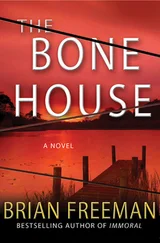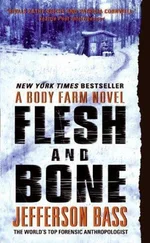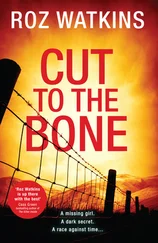“Makes sense.”
A moment later, the radio intruded on him. “Deck, this is Hackworth. Where the hell are you, and why? Am I to understand that you’re no longer at the Satterfield house? That you’re en route to the Brockton house?”
This was trickier. Being evasive with the dispatcher was one thing; lying to the captain was another, far bigger thing. “Yes sir, I am en route there.”
“You? The whole team? What the hell are you doing, Deck? You’re supposed to be guarding the perimeter of the Satterfield house.”
“Yes, sir. My men are still on that. All over it.” He kept talking, improvising, not wanting to give the captain an opening. “It’s a personal errand, sir. Kevin took a class from Dr. Brockton a couple years ago.” That much was true. “The Doc was one of Boomer’s idols.” Also true. “I’m taking something over there, to the Doc. A memento, sort of. Something I think Kevin would’ve wanted me to do.” It was lame, but even that had some truth to it: safety; protection; justice—Kevin would certainly have wanted his big brother to deliver those things.
“Stand by, Deck.”
Shit, thought Decker. He’s calling Kittredge . If Kittredge tells him the ID’s no good, he’ll figure it out. He’ll know what I’m doing, and he’ll tell me to stand down. “Shit.” He said it aloud this time. He didn’t want to stand down; didn’t want to wait for backup. Wouldn’t stand down; wouldn’t wait.
Careening down the final curve, he saw the river glittering through the trees on his left, separated from the road by a ribbon of shoreline park. He slung the car around the traffic circle; around the big, lighted fountain with its geyser of glowing water. Then he reached out and switched off the radio, so he would not hear the order that he was about to violate.
CHAPTER 47
Tyler
SLUMPING BACK AGAINST THEstreetlight, Tyler pressed two fingertips to his neck and checked his watch: 30 heartbeats in 10 seconds; 180 beats per minute. Not his max, but damn good. So why didn’t he feel better? Normally a run this hard—five fast miles, pounding up Cherokee Boulevard to Kingston Pike and then back along the riverfront—would clear his mind completely, put him into a zenlike state of blissful exhaustion. Tonight, though, all he had was the exhaustion, not the zenlike bliss. Zenlike bliss? What the hell was that? He couldn’t even remember it, let alone feel it.
Shit, he thought, I have to do it . He’d been fighting it, resisting it for three days, even though he knew it was the right thing. He pushed off from the lamppost and found himself jogging—slogging, more like—up a side street, away from the gravel lot at the end of the boulevard where his truck was parked. Away from his truck; toward Dr. B’s house. Sweaty and sticky though he was, he couldn’t put it off any longer; he had to tell Brockton he was quitting. There was no guarantee that quitting the program would make it possible to fix what had gone wrong between him and Roxanne; what was going wrong within himself. But staying in the program—walking through the valley of the shadow of death, again and again—would almost certainly wreck things forever. “You might think it’s hypocritical of me,” Rox had written to him in her last note. “After all, as a doctor, I’ll spend decades keeping company with death. But I’ll be pushing against it—opposing it, not embracing it.”
Tyler had tried to figure out how Dr. B did it: The guy was up to his elbows in death and dismemberment, yet he had one of the sunniest dispositions Tyler had ever seen. How did he do it? How did he keep from being dragged down by the cases, by the oppressive weight of evil? Damned if I know, he thought.
The Brocktons’ house was two blocks off the boulevard, in a pocket of houses that were much smaller and less showy than the mansions along Cherokee. The house was tucked deep in the lot, surrounded by maples and hemlocks. From the curb Tyler wasn’t sure anyone was home—the front windows were dark—so he jogged down the driveway and toward the back, to check for lights in the kitchen, dining room, den, or master bedroom. Tyler had fond memories of the master bedroom—of the seven Edenic days and nights he and Roxanne had spent there, ostensibly keeping an eye on the place, but in reality having eyes only for one another. Lotta water under the bridge since then, he thought—most of it muddy and malevolent, or so it seemed at the moment.
Parked halfway down the darkened driveway was an old Corolla; was that what Dr. B had ended up buying for Jeff, after Tyler refused to sell the truck? Tyler stopped and peered through the driver’s window. A five-speed; good, he thought .
Now that he’d stopped moving again, his legs turned leaden, and a sharp pain began gnawing at the meniscus cartilage on the inside of his left knee. He thought about turning tail, waiting until tomorrow, catching Dr. B in his office first thing. But the prospect of leaving things hanging for another night—another sleepless night—was unbearable, so he turned toward the house again, limping past the garage and up the stairs to the backyard and the patio off the kitchen. Pitiful, he thought. Not just the limp, but the whole sorry mess he’d made of things, first with Roxanne and now with Dr. B.
Golden light poured through the windows of the kitchen and back door, pooling on the flagstones of the patio, and Tyler suddenly felt himself drowning in that pool of light and warmth, drowning with longing and loneliness. A figure—Jeff?—emerged from the stairwell and turned toward the kitchen. He listened for voices, but the sounds inside the house were drowned by the noise of the heat pump, its compressor whooshing in the shrubbery beside him.
A picnic table flanked the near side of the patio, and Tyler sat on one of the benches to compose his thoughts, compose his verbal resignation. He considered and rejected half a dozen different opening lines.
Quit stalling, he berated himself. Just knock, and get it over with.
CHAPTER 48
Satterfield
SATTERFIELD GLANCED FROM FACEto face, reveling in how well things were going—better, even, than he’d imagined they would. The three Brocktons and the girl were seated around the kitchen table in a bizarre variation on family dinner: four half-finished plates of pasta and salad in front of them, duct tape over their mouths, zip ties cinching their ankles and wrists to the frames of the ladderback chairs.
The girl had been a surprise. “She has nothing to do with this,” Brockton had tried arguing. “Neither does Kathleen or Jeff. This is just between you and me. Let them go.” Satterfield had cocked his head, pretending to consider the stupid request; then he’d smiled, shaken his head, and yanked the tape tight across Brockton’s mouth. The girl was a juicy little bonus; a windfall apple. Manna from heaven, he thought.
Brockton would be the last to die, of course. A big part of his suffering—though far, far from all of his suffering—would be to witness the agonies of the others, knowing that he himself was to blame. Utterly and solely to blame.
Laying the gun on the end of the table, Satterfield reached into his back pocket for the gardening shears. He held them toward the light, squeezing the spring-loaded handles, admiring the tight precision with which the blades closed and opened. Their curved edges—the upper blade convex, the lower one concave—reminded him of a cartoon fish, grinning with its oversized mouth. The coiled spring that pushed the handles apart made a soft, musical squeak each time the cartoon-fish mouth opened or closed. Pointing the tool toward each of them in turn, he recited, “Eeny meeny miny mo . . .” He paused and looked at Brockton again. “Or do you want to choose? Tell me—shall I start with the girl?” He smiled as Brockton grunted and shook his head frantically. “No? With your son, then?” He leaned across the table, the shears opening in his hand as he dropped the jaws below the table and toward the boy’s crotch.
Читать дальше











